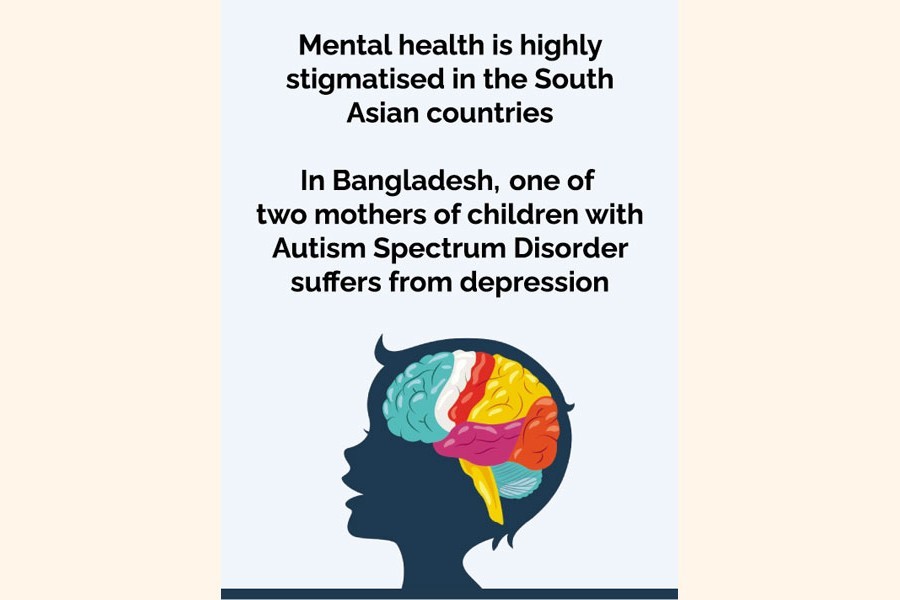A study of the icddr,b on a low-cost school-based mental health intervention in Bangladesh has found promising outcomes in improving depression status and life quality of mothers of children with autism.
The findings of the study - 'Feasibility of Implementing a Mental Health Care Program and Home-Based Training for Mothers of Children with Autism Spectrum Disorders in an Urban Population in Bangladesh (MENTHOL)' - were published in the Global Mental Health Journal.
The study was led by Dr. Aliya Naheed, Scientist and Head of Initiative for Non-communicable Diseases at the icddr,b, in collaboration with Boston Children's Hospital and Harvard Medical School (HMS), USA, Shuchona Foundation, Institute of Paediatric Neurodisorder and Autism, Bangabandhu Sheikh Mujib Medical University, National Institute of Mental Health & Hospital, and National Institute of Neurosciences & Hospital.
In a press release, the icddr,b stated that mental health is highly stigmatised in the South Asian countries, and there is inequity in mental health services. In Bangladesh, every one of two mothers of children with Autism Spectrum Disorder (ASD) suffers from depression.
Considering the stigma towards mental health and autism in the country, an innovative mental health care intervention was introduced in two schools in Dhaka city through Autism Welfare Foundation (AWF) and Society for the Welfare of Autistic Children (SWAC) as part of a research in 2017.
The intervention was pilot tested between January 2017 and December 2018, which was developed by an Expert Working Group (EWG), comprising of eminent psychologists, psychiatrists, neuro-developmental specialists, and national and international scientists.
A specially designed Psychological Counselling Service (PCS) was offered in the two schools for six months as a part of the routine services. It was offered to all mothers, who had children enrolled in the schools during the study period.
Following the intervention, mental health state of most of the mothers improved, including significant improvement among 40 per cent mothers, who had depression, and among 23 per cent mothers, who had no depression.
The overall out-of-pocket cost for availing PCS was about US$ 1.0 (Tk 80 taka) per session for a mother. Half of the mothers acquired normal mental health state after four sessions, and the overall quality of life improved among the mothers - irrespective of having depression.
Saima Wazed, Chairperson of Shuchona Foundation and Member of the World Health Organization's (WHO) Expert Advisory Panel on Mental Health, said finding a workable solution for the mental wellbeing of such parents has been a much-neglected area of work within the field of mental health.
These parents have to deal with the complex challenge of raising children on the autism spectrum; and they constantly face discrimination, social isolation, and other injustices.
"The MENTHOL project provides us with the much-needed evidence that not only tells us how mental health programmes can be provided to those who urgently need it, but also that such specialised care can be effectively provided in a manner that makes participation easy and effective," added Saima Wazed, also faculty member at Barry University, USA, and co-author of the MENTHOL study.
Professor Kerim M Munir of Boston Children's Hospital, Harvard Medical School, and senior investigator of the MENTHOL study, said globally burden of depression among the mothers of children with autism is high, and it negatively impacts the mothers' quality of life that eventually affects the care of their children.
"The intriguing component of the MENTHOL service model is that it can address two highly sensitive issues, such as autism and maternal mental health, at the same time. We could observe impressive results following a short-term service at a very low cost, which is unique," he noted.
Professor Salmaan A Keshavjee, Director of Harvard Medical School's Centre for Global Health Delivery, said mitigating burden of depression for the mothers of children diagnosed with ASD is a critical need worldwide.
The study demonstrated that it is possible to deliver a high standard of care to people, who desperately need it while living in economically and socially vulnerable situations.


